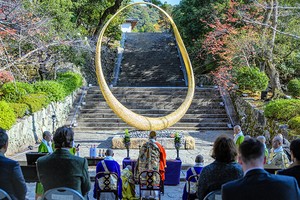Vox Populi, Vox Dei is a daily column that runs on Page 1 of The Asahi Shimbun.
November 19, 2021 at 12:50 JST
 People gather around a “takarakuji” lottery ticket booth in Tokyo’s Ginza district in December 1947. (Asahi Shimbun file photo)
People gather around a “takarakuji” lottery ticket booth in Tokyo’s Ginza district in December 1947. (Asahi Shimbun file photo)
In 1947, two years after the end of World War II, runaway inflation tormented Japanese citizens.
Water charges had risen eight-fold since the end of the war, postal rates had grown by 12 times and the price of white rice had soared 25 times higher.
People who owned no land to grow food sold their clothing and household goods to farmers in exchange for food.
At the end of that year, a “takarakuji” lottery with the top prize of 1 million yen ($8,770 at the current exchange rate) was introduced for the first time.
People were asked how they would spend it if they won. Here are some of their answers: “I’ll get smashed on black market sake.” “I want to provide warm homes to orphans.” “I’ll buy a house and get married.”
That year, the salary of Diet members was raised to 5,500 yen per month, sharply up from 3,500 yen. Other perks were also introduced: a monthly allowance of 125 yen for communication expenses and 40 yen per day for miscellaneous accommodation expenses.
Telegraphs were indispensable to political activities back then, and the office buildings for Diet members in Tokyo did not yet exist.
The two types of allowances were later consolidated, entitling Diet members to a payment of 1 million yen per month.
Now, these allowances are coming under review following an outcry over what is dubbed the “1 million yen a day” issue.
Those who won their first Lower House seats in the Oct. 31 election, as well as former lawmakers who returned to the chamber after losing in a previous poll, were paid the full monthly allowance for being in office for just one day.
The Diet has dragged its feet on disclosing how members are spending these allowances, but they are funded by taxpayers’ money.
How can taxpayers be sure their money is not being splurged on nights out at Ginza clubs or handed out to buy votes at election time without their knowledge?
If lawmakers are open and aboveboard and have nothing to hide, the Diet has no reason not to disclose how the allowances were used, together with receipts.
The 1 million yen lottery of 1947 went to a boy from Fukushima Prefecture, who told the media without the slightest hesitation: “I’m depositing half in a postal savings account, and the rest will be spent on my younger brothers’ education.”
His face graced newspapers with his big, sunny smile.
--The Asahi Shimbun, Nov. 19
* * *
Vox Populi, Vox Dei is a popular daily column that takes up a wide range of topics, including culture, arts and social trends and developments. Written by veteran Asahi Shimbun writers, the column provides useful perspectives on and insights into contemporary Japan and its culture.




















A peek through the music industry’s curtain at the producers who harnessed social media to help their idols go global.
A series based on diplomatic documents declassified by Japan’s Foreign Ministry
Here is a collection of first-hand accounts by “hibakusha” atomic bomb survivors.
Cooking experts, chefs and others involved in the field of food introduce their special recipes intertwined with their paths in life.
A series about Japanese-Americans and their memories of World War II